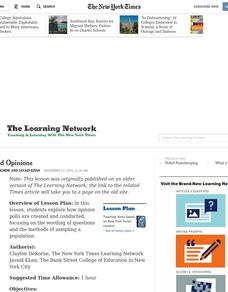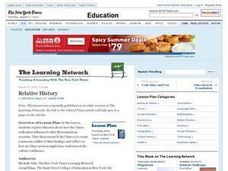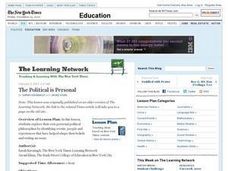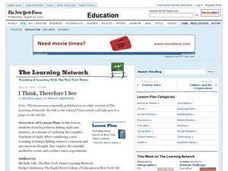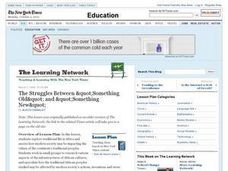Curated OER
A Distant View
Students investigate the essential concepts of how lenses work to magnify vision, and then build simple telescopes to demonstrate their understanding. They write a description of how their telescope could be improved and how it works.
Curated OER
Measured Opinions
Students read "Public Is Wary but Supportive on Rights Curbs," at the New York Times online. They explore how opinion polls are created and conducted, focusing on the wording of questions and the methods of sampling a population.
Curated OER
What a Cosmic Web We Weave
Students explore, using journals and discussion in small groups, how the universe has evolved since the theoretical Big Bang and create dramatizations of various eras in cosmic evolution.
Curated OER
Extraordinary Extrapolation
Learners study how scientists have estimated the maximum height to which trees can grow, and assess the reliability of interpolation and extrapolation techniques by making predictions with particular data sets and analyzing accuracy of...
Curated OER
Rhythm Nation
Students read a New York Times article to help them develop an understanding of the history, development, and social influence of various types of world music through the creation of music museum exhibits.
Curated OER
In Living Color
Students explore, through discussion and experimentation, colorblindness and how the color of the light passing through the eye changes how different colors are perceived.
Curated OER
Always Remember, or Eventually Forget
Students examine one writer's opinion about how different generations of Japanese citizens have been influenced by the bombings of Hiroshima and Nagasaki.
Curated OER
State of the "States"
Students consider indicators that mark a country's progress, examine how last year's State of the Union address has affected U.S. foreign policy, research issues deemed important in that speech, and create report cards assessing the...
Curated OER
Relative History
Students explore theories about how the Olmec civilization influenced other Mesoamerican societies. They research the Olmecs to create a museum exhibit of their findings and reflect on how an Olmec person might have understood the...
Curated OER
Our Robots, Ourselves
Young scholars imagine how they might use a robot in their daily lives, explore advancements in artificial intelligence, investigate robotic technology under development, and prepare posters that show how robotic technology might be...
Curated OER
What Sticks from '06
Students identify significant events that helped shaped 2006. Completing a news quiz, they discuss the importance and impact of each event mentioned. They create their own news quizzes to be used as a class. They create a poster...
Curated OER
Advising China
Students express their opinions about how growth and modernization affect nations. Reading an article on China, they discuss the causes and effects of exponential growth in a single town. They research how China has changed by writing...
Curated OER
The Political is Personal
Students examine their own political party affiliations and political beliefs. After reading an article, they discuss how students at Duke define their political philosophies. They brainstorm events, people and experiences that have...
Curated OER
I Think, Therefore I See
Students participate in a memory experiment to discover how the eye works. After reading an article, they analyze a new technique which examines how the brain registers sight. They develop their own memory game and conduct trials using...
Curated OER
A Glacier Ran Through It
Students learn basic geological concepts while researching how ice age floods sculpted the plateau of the Columbia Basin. They synthesize their learning by creating annotated illustrations of the geological principles they studied.
Curated OER
Breezy, Chilly, or Freezing?
Students assess the factors which influence the sensation of being "cold" in a particular situation. They study the complexities in measuring temperature by reading and discussing the article "Beyond Brrr: The Elusive Science of...
Curated OER
Everyday Objects
Students reflect in their journals about an everyday object they take for granted. After reading an article, they examine what a cook's tools can reveal about their life. In groups, they research everyday objects and write a museum...
Curated OER
The Struggles Between "Something Old" and "Something New"
Students explore traditional life in Africa and assess how modern society may be impacting the values of the continent's traditional peoples. Students work in small groups to research various aspects of the infrastructures of African...
Curated OER
Laws and Force in Law Enforcement
Students investigate the issues of police brutality, use of excessive force, and the underlying issues by participating in a round-table discussion. They compare how these issues are explored differently in different types of...
Curated OER
Appliances with Minds of Their Own
Young scholars examine how everyday appliances might soon possess the capacity "to think" as a result of recent technological advances. A display of their knowledge of this new technology by creating a poster design of a "smart" machine.
Curated OER
Flights of Fancy?
Students reflect on the dynamics of human flight and how objects fall through the air and how science principles are used in flight.
They create a How-It-Works poster diagramming the science behind one method of flying. In addition,...
Curated OER
Banking on a Good Turn
Students research the economies of countries in the Group of 8 and present how their economies have changed over the past five years and how the relationships among these countries affect each other in light of world events.
Curated OER
Picking Up the Pieces
Students recall and write about a time in which they felt helpless, focusing on how they coped with the situation then and now.
Curated OER
"A Voice of Moderation and Civility"
Students read about, discuss and reflect on the life of retired Justice Lewis Powell, investigating major court decisions he influenced and the impact of his 'voice of moderation and civility to an increasingly polarized (Supreme) court.'



